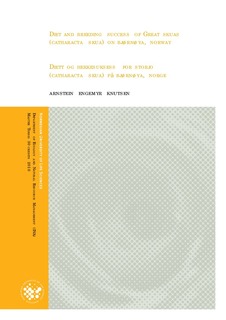Diet and breeding success of great skuas (Catharacta skua) on Bjørnøya, Norway
Master thesis
Permanent lenke
http://hdl.handle.net/11250/186706Utgivelsesdato
2010-12-27Metadata
Vis full innførselSamlinger
- Master's theses (INA) [593]
Sammendrag
The last 40 years there has been a marked increase in the number of Great skuas
(Catharacta skua) in Norwegian territory, and it seems as if the core distribution area is
shifting, from Iceland and Shetland, northwards to the Barents Sea region. As a generalist
and top predator in the marine ecosystem the Great skua has a broad range of available
prey, and their impact on prey species, particularly other seabirds, is poorly understood. The
diet of Great skuas during winter is largely unknown, because they live mostly out in the
open ocean. As they come to shore to breed, it is possible to obtain an estimate of the diet
during the breeding season through analysis of regurgitated pellets. The pellets were
collected from a total of 25 Great skua nests in 2008 and 2009. Each nest was visited every
fifth day from hatching, and chicks were weighed and measured at each visit. Almost all
pellets contained remains from birds while 38 % contained remains from fish. On average,
62 ± 3.7 % of pellets from a pair contained only seabird remains. In 2008, dietary
specialization toward seabirds was found in 33 % of the pairs, compared to 62 % in 2009.
The overall diet composition did not differ between years, but the proportion of fish in
pellets varied between pairs within years. As the breeding season progressed the probability
of fish being found in pellets decreased. Body mass, tarsus length and wing length of chicks
were negatively correlated with the proportion of pellets with only fish. Hatching dates
varied between years, being delayed in 2009. Breeding success was higher in 2008 than in
2009. There was no relationship between the number of chick survival to age 15 days (D (15)
= fledging success) and differences in specialization, but in 2009 there was a positive
relationship between the survival of chicks at the end of the field work and a specialist diet.
This indicates that dietary specialization among Great skua pairs on Bjørnøya can have
positive effects on fledging success, and hence also breeding success.
